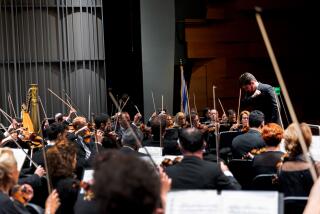Henryk Gorecki dies at 76; composer of âSymphony of Sorrowful Songsâ
Henryk Gorecki, a Polish composer famous for his Third Symphony, also known as the âSymphony of Sorrowful Songs,â died Friday following a serious illness. He was 76.
Gorecki (pronounced Go-RET-ski) died in the cardiology ward at a hospital in his home city of Katowice in southern Poland, said Joanna Wnuk-Nazarowa, director of the Polish Radio orchestra in Katowice. She said he was suffering from a number of ailments, chiefly a lung infection.
Goreckiâs works ranged from dissonant modernist compositions to traditional choral hymns. Much of his music uses simple harmony, minimal means and repetition in a style often called the âNew Simplicity.â
He was best known internationally for his Symphony No. 3, Opus 36, for a soprano and orchestra, which he composed in 1976. It became a bestselling recording, with more than 1 million copies sold, much later, after Elektra Nonesuch released its 1991 recording featuring soprano Dawn Upshaw, conductor David Zinman and the London Sinfonietta.
Although his early works were more avant-garde, Gorecki was later influenced by traditional Polish music and themes of war and loss in his nationâs history, as reflected in the contemplative âSymphony of Sorrowful Songs.â
Its three movements contain soprano parts about Mary, the mother of Jesus; a female Polish prisoner held by the German Gestapo during World War II, and a Polish folk song about a mother searching for her dead son. The second song is based on a prayer that was found inscribed by a prisoner on the wall of her cell in a Nazi police prison in occupied southern Poland.
Gorecki was persuaded to come to Los Angeles in 1997 to conduct the Third Symphony for the first time in America. The performance by the USC Symphony Orchestra and soprano Elizabeth Hynes at Bovard Auditorium was part of a five-day âGorecki Autumnâ music festival organized by USCâs Polish Music Center.
âThe performance was simply extraordinary,â Times music critic Mark Swed wrote in his review of the concert. â⦠The amplification of the simple into the monumental through repetition serves here as perhaps the only way to comprehend the Holocaust, the amplification of individual loss into mass destruction. And beauty, wondrous beauty, this symphony tells us, has to be found in the smallest cracks in the wall in order to transcend terrible suffering.â
Gorecki, a Catholic who opposed Polandâs former Communist regime, often found inspiration in his religious background. âBeatus Vir,â completed in 1979, is a psalm for baritone, choir and orchestra. The work was commissioned by Archbishop Karol Wojtyla before he became Pope John Paul II to mark 900 years since the death of Roman Catholic martyr, Stanislaw, bishop of Krakow â whom Pope John Paul II later made a saint.
In awarding Gorecki an honorary fellowship in 2008, Cardiff University praised the composer for âhis independence of thought and independence of spirit. His work is grounded in a profound humanity and is rooted in the folk and religious culture of his native Poland.â
Henryk Mikolaj Gorecki was born Dec. 6, 1933, into a musical family in Czernica, near Rybnik in the coal mining Silesia region in southern Poland.
In 1960, he graduated from the State Higher School of Music in Katowice, where he studied composition. Eight years later, he joined the faculty and was its head from 1975 to 1979.
In his early career, Gorecki was influenced by avant-garde composers such as Bela Bartok and Karlheinz Stockhausen and cultivated an austere, cerebral style.
His monumental Second, or âCopernican,ââ Symphony marked a transition to a more traditional mode of expression.
Composed in 1972 and featuring a choir and texts from biblical psalms, it celebrated the 500th anniversary of the birth of Polish astronomer Nicolaus Copernicus, who established that the Earth circled the sun and not the other way around.
Last month, in his hospital bed, Gorecki received Polandâs highest distinction, the Order of the White Eagle, bestowed by President Bronislaw Komorowski.
The composer is survived by his wife, Jadwiga, a piano teacher; a daughter, pianist Anna Gorecka-Stanczyk; and a son, composer Mikolaj Gorecki.
More to Read
Start your day right
Sign up for Essential California for the L.A. Times biggest news, features and recommendations in your inbox six days a week.
You may occasionally receive promotional content from the Los Angeles Times.






